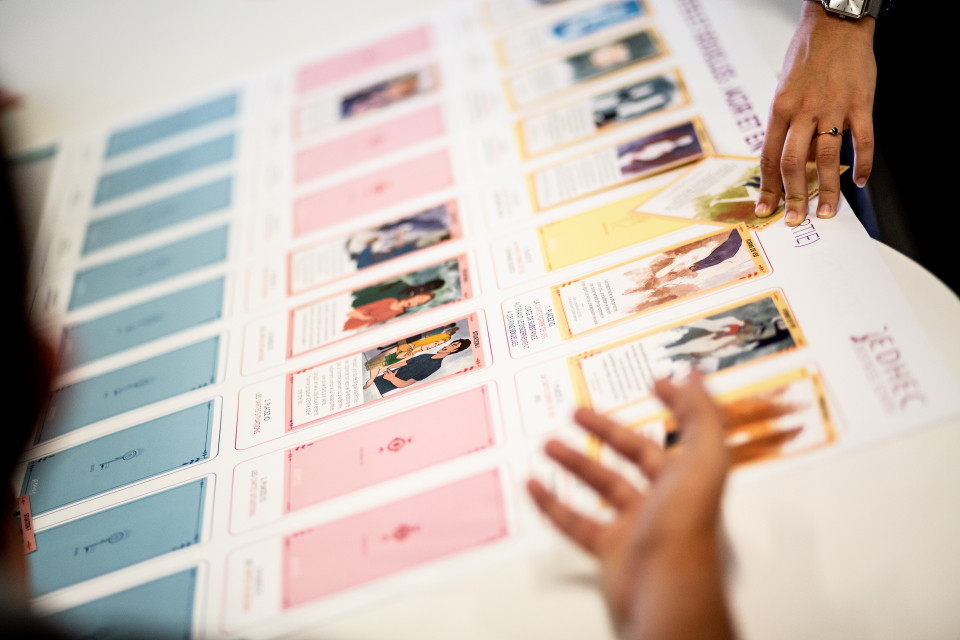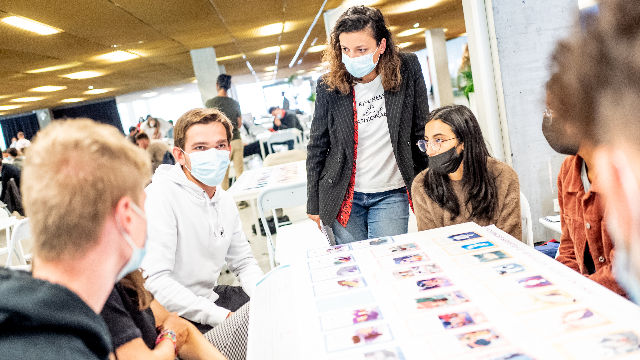The Open Leadership for Diversity & Inclusion chair proposes an innovative pedagogic approach to reflect EDHEC’s commitment to combating sexist and sexual violence
On 26 August 2021, 715 students were invited to take part in an innovative game to raise awareness about sexist and sexual violence (SSV), developed by the Open Leadership for Diversity & Inclusion chair. The experience was repeated during workshops for EDHEC International BBA students on 7 October in Lille.
We caught up with the chair's director, Hager Jemel, who told us about the origins of this game and her ambitions moving forward.
Coming up with the idea
In order to raise awareness of societal issues among young people, inclusion in particular, seminars based on practical examples have been run by the Chair since 2019. These are an opportunity to discuss gender equality, disability, maternity, paternity and sick leave and the impact they have on careers and feelings of fairness and inclusion. Due to the success of these workshops and seminars, the Chair decided to go even further with an effective and innovative pedagogic approach to raise awareness of SSV among young people.
“We needed to find something innovative that we could use, in a short time, to convey to students both very practical knowledge about what constitutes SSV and how to identify it in their environment, but without scaring them away.”
This project began in February 2021 with a seminar as well as a survey to find out more about students’ needs, expectations, level of maturity, and what they did and did not know about SSV.
This survey and the ensuing discussions allowed the Chair to come up with 3 core ideas for the project:
- Work on this issue by means of a card game
- Organise discussions to address the issue
- Run a MOOC targeting young people
Creating the game
For Hager and her team, although the project was considerable and the timeframe short, the mission was not impossible: “we knew what we wanted to achieve, and we had done the groundwork. That’s what allowed us to design and produce the game in record time despite the scale of the task”.
To work on and validate the 3 central ideas, working groups made up of student and alumni volunteers were formed to take part in 10 sessions during which the game’s format was determined. The Chair also drew on expert advice to make sure the right sources and legal texts on SSV in France were being used. Following these constructive and at times animated discussions, the Chair sent a prototype to print. It was then tested on 20 July using the same panels.
After a few changes, the game, entitled “Act now to bring an end to sexist and sexual violence! ”, was launched on 26 August with the participation of students from EDHEC.

How it works
The game is played as part of a workshop involving 7 students overseen by moderators trained by the Chair. It lasts around 3.5 hours. It is presented in the form of 52 coloured playing cards:
- In orange, the different forms of SSV
- In red, scenarios of SSV (illustrated cards)
- In light blue, the statistics
- In dark blue, the different tools and behaviours that can help
The Chair felt that the game should include a board to provide a framework and make the rules clear: “We wanted it to be a board game, because there’s no point in reinventing the wheel. There are different forms and scenarios of SSV and just one way to name them and place them on the board. Unlike other games addressing different themes with greater freedom in the way you see and perceive things, the identification and understanding of SSV scenarios are closely structured by the law. The cards have specific locations on the board, and there is no other way to place them”.
One side of the board is for the initial stages in the game:
- Identify the forms of SSV and their legal implications
- Recognise SSV scenarios
- Act by adopting the right reflexes when faced with SSV
- Analyse the context with facts and figures
The students then turn the board over and must come up with the right responses to help a victim of SSV as well as things to avoid. They can reflect and share their ideas using post-its. The moderators are trained to help them and steer them towards tangible solutions documented using the “tools and behaviours” cards so the students have the means to act when they encounter situations involving SSV, as either a victim or a witness.

What’s next?
“This game will now become an annual event for all new students arriving at EDHEC”
Other seminars have also been scheduled (21 October in Lille and 20 & 21 January in Nice) for EDHEC International BBA students to raise their awareness of SSV using the game.
“This is in line with EDHEC’s strategy, we have developed tangible initiatives targeting priority areas set out in the 2025 plan”
Following the success of this first test and to reinforce the commitment of EDHEC, the Chair does not intend to rest on its laurels. Hager and her team plan to share this initiative with partner schools and adapt it to the corporate world. The Chair is counting on the alumni community to support these developments: “alumni can undergo training and become moderators to run this game with students and later in companies. They are the best possible ambassadors for it”. Plans for certification are even underway so that trained moderators can get recognition for their knowledge and experience in raising awareness of SSV.

Comments1
Please log in to see or add a comment
Suggested Articles



